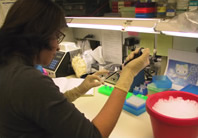Last updated: March 14, 2014
NIH Requests Public Comments on the Genetic Testing Registry (GTR)
NIH Requests Public Comments on the Genetic Testing Registry (GTR)
By Jeannine Mjoseth
NHGRI Deputy Communications Director

"The need for this database reflects how far we have come in the last 10 years," said NIH Director Francis S. Collins, M.D., Ph.D. "The registry will help consumers and health care providers determine the best options for genetic testing, which are becoming more and more common and accessible."
During the 60-day comment period, NIH is requesting comments on:
- whether collecting genetic testing information is necessary and will add value.
- ways in which the quality and usefulness of testing data can be enhanced.
- ways in which technology can be used to ease online data submissions.
- whether NIH's calculation of staff time and other resources spent submitting data is accurate.
Up to 770 labs could submit data for as many as 9,360 genetic tests to GTR, according to NIH's analysis of data from the GeneTests Laboratory Directory, the most comprehensive listing of labs that provide genetic tests. The National Center for Biotechnology Information (NCBI), part of NIH's National Library of Medicine, administers the GeneTests Laboratory Directory. NCBI will also administer GTR with oversight from the NIH director's office. NIH believes it makes more sense - both technically and financially - to develop GTR than to reengineer GeneTests, which was not designed to support the range of test technologies that the registry plans to cover or to contain a detailed amount of data for each test.
As GTR is now configured, submitters would enter information about a genetic test once, add new tests on a continual basis and update test information once a year. GTR submitters would include clinical labs, test manufacturers, researchers and entities that report and interpret tests performed elsewhere. GTR would include both U.S. and international submissions.
In order to participate in the voluntary program, the submitter would, at minimum, answer 31 questions about each genetic test, with the option of answering 85 additional questions. NIH estimates it would take submitters an average of 30 minutes per test to provide the minimum information and an estimated 2.5 hours per test to answer the additional questions.
GTR's Backstory
NIH proposed GTR in March 2010 based on recommendations from the Secretary's Advisory Committee on Genetics, Health and Society (SACGHS). The working group that made the recommendations in April 2008 included NIH policy experts, including National Human Genome Research Institute (NHGRI) staff.
"The registry should offer a one-stop shop for health care providers interested genetic tests," said Greg Feero, M.D., Ph.D., special advisor to the NHGRI director for genomic medicine. "GTR will enhance the ability of all health care providers to take appropriate advantage of the burgeoning number of genetic tests available for common and rare diseases as well as pharmacogenomics." Pharmacogenomics is the science that examines how the genes we inherit from our parents influence how we respond to drugs. Health care providers can then anticipate which drugs will and won't cure a specific person. Providers can also use the information to avoid prescribing medication that won't help and might even hurt.
Genetic testing encompasses an array of techniques, including the analysis of human DNA, RNA and proteins. Testing can be used to detect genetic mutations associated with a specific disease or condition and for non-clinical uses such as paternity testing and criminal forensics. Genetic tests can also be performed to confirm a suspected diagnosis, to predict the possibility of future illnesses, to detect the presence of a carrier state in unaffected individuals whose children may be at risk and to predict responses to therapy. Genetic tests are also performed to screen for genetic mutations in fetuses, newborns and embryos.
The Food and Drug Administration (FDA) regulates tests that are sold as diagnostic devices if they are manufactured by one company and sold as a kit to a lab for genetic testing. FDA does not regulate tests that are both manufactured and performed by the same lab. Because of this regulatory exception, some genetic testing services are marketed directly to the medical community and public without FDA regulation or oversight. The registry intends to fill this gap.
To facilitate the research process, the registry's genetic test data will be integrated with information in other NIH/NCBI genetic, scientific and medical databases.
"This is an ambitious initiative," said William Gahl, M.D., Ph.D., NHGRI clinical director. "The increased accessibility to information on genetic testing, whether histological, biological or molecular, will be extremely helpful for the genetics community of basic researchers, patients and advocacy groups."
For information on submitting comments to NIH, please visit Office of Biotechnology Activities. For information about the Genetic Testing Registry and NCBI, please visit Genetic Testing Registry.
